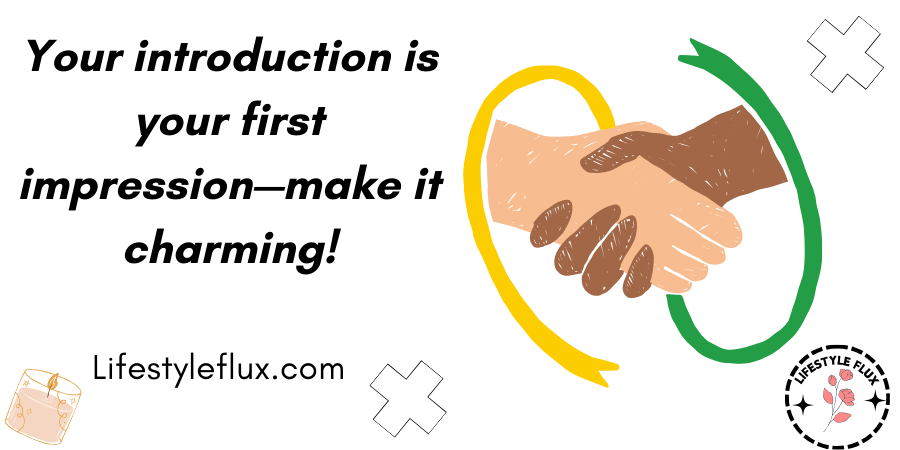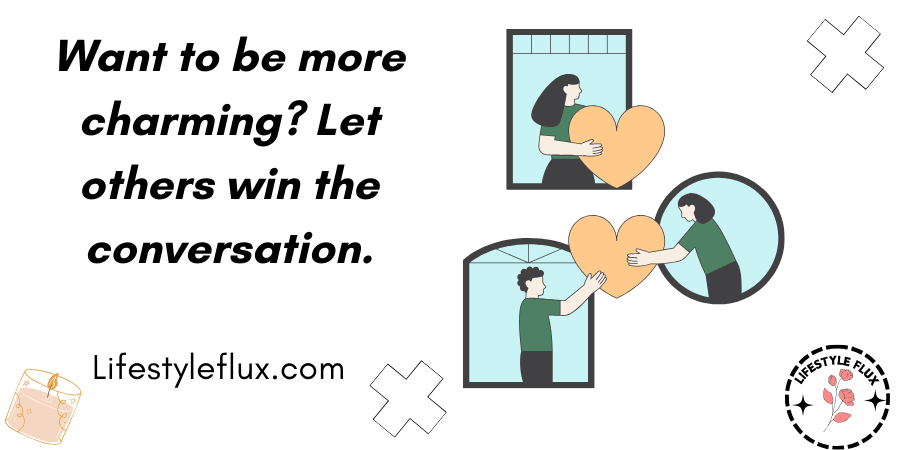Charm isn’t just some magical gift reserved for the lucky few—it’s a skill you can develop, refine, and master. Believe it or not, you don’t need a complete personality overhaul to do it.
In fact, 5 Simple Steps to Instantly Become Charming! It will show you how small, strategic changes can make people naturally gravitate toward you.
From the moment you introduce yourself, people form an impression—whether you realize it or not. Just like the first page of a book sets the tone for the story, your introduction shapes how others perceive you.
And once that perception is set, it’s hard to shake. But here’s the good news: by mastering a few key social habits, you can steer those first impressions in your favor and make charm an effortless part of who you are.
Table of Contents
1. The Power of a Genuine Introduction
Greetings are like the first page of a book. They give your audience a glimpse into the kind of story they’re about to read. If it’s an epic battle with dragons and monsters, they’re expecting action-packed fantasy.
If it’s a letter to someone’s lost love, they’re expecting romance or drama. My point is that your introduction sets the tone. It tells people what to expect.
As you might have guessed, these expectations affect their perception of your personality. When people expect something, they look for it. They’re more likely to find it, even if it’s not there.
This isn’t much different from the placebo effect. The placebo effect is when your brain convinces your body that a fake treatment is actually working. Of course, you don’t know it’s fake.
You think you’ve been taking real medication, but in reality, they were just sugar pills.
So, how do introductions use the placebo effect? Let’s say you enter a conversation with a charming introduction. You’re happy and confident. You give a good, firm handshake. You smile and look them in the eye. Right off the bat, people will think highly of you.
You set a positive tone. You made sure that the first page of your book reads “charming and charismatic.” So, from then on, people will assume that’s your personality—just like someone assumes the medicine they’re taking is real.
But here’s the catch: for introductions and the placebo effect, it all falls apart if no one believes you. Just think about what happens when a patient figures out they’re taking sugar pills.

Obviously, they feel deceived, and the treatment isn’t going to work—even if the sugar pills cure other patients. It won’t do anything for them. Introductions fail for the same reason.
If you’re not genuine, no one’s going to believe you. You won’t create those expectations. You have to sell your first impression and make sure your audience buys it.
So, when you smile, smile because you mean it. Smile because you’re happy to see them. And when you make eye contact, show them that you actually want to establish a personal connection.
The real charm isn’t something you can lie about. You can work on it. You can practice it. You can alter your behavior to become more inviting and charismatic, but you can’t fake it.
Luckily, the best time to show someone that you’re genuine is right at the beginning—by perfecting your introduction. People won’t just wonder if you’re charming; they’ll really believe it.
2. Instant Facial Judgments
Some people will judge your charm based solely on your appearance, and it may only take them a tenth of a second. In that extremely short period of time, they look at your face, analyze your features, and decide whether or not you’re likable.
Now, is that reliable? No. Is it accurate? Probably not. But that doesn’t stop people from doing it all the time.
In fact, a 2005 study predicted elections based solely on these snap judgments. Participants only needed one second—that’s one second—to look at someone’s face and judge their personality.
But it wasn’t just random. People made the same judgments about the same candidates. Certain traits made them more competent; others made them more dependable.
That’s how researchers correctly predicted almost 70 percent of the Senate races in 2004. All they did was pick the candidates with the most likable faces. And man, they were usually right.
So, how can you use these snap judgments to your advantage? While you can’t control the shape of your face, there are physical changes that will make you more charming.
For example, people are drawn to physical health. Now, I’m not saying you have to be a professional athlete. In fact, being too fit or too muscular decreases your charm.

But maintaining a healthy weight works in your favor. A 2011 study found that people with average or slightly below-average weights are viewed as more intelligent and likable.
The same goes for cleanliness. Good personal hygiene has a huge impact on people. Little things like a neat haircut or clear skin show people that you care. It says that your appearance matters to you.
It means that you’re willing to put in the effort. Finally, some of your physical charm comes from your wardrobe. But you don’t need the most expensive suits or dresses.
Just like health and hygiene, people want to see effort. Take some time to research what people are wearing. Find out what’s appropriate and what’s not. It might seem like a waste of time, but a little work goes a long way. Remember, you’ve only got a tenth of a second to work with here.
So, as you’re improving your appearance, here’s a little trick that’ll give you some direction: pick a word. Maybe it’s “charming,” “intelligent,” “confident,” or “funny.” Whatever it is, your goal is to embody that word—not only in things that you say but also in the way you look.
3. Losing Social Competitions
Charm isn’t about blowing people away. This is actually a really common misconception. You’re not supposed to charm others by impressing them. You win them over by letting them impress you.
Just think about any social interaction, like a race. How does it feel to get first place? Pretty great, right? You’re proud. Your confidence soars. You feel empowered.
Now, what about second place? You’re still proud. You’re still confident, but it’s kind of bittersweet. A part of you wishes you ran a little bit faster. Maybe then you’d be standing at the top of the podium, showing off your gold medal.
Social interactions work in a similar way. There aren’t any medals, but there are winners and losers. You can walk away from a conversation feeling great about yourself, or you can walk away feeling weak and insecure.
By trying to impress people, you’re going for the gold. You want them to admire you. You paint this image of yourself as flawless and accomplished. And sure, it makes you feel great.
But charm isn’t about how you feel; it’s about how other people feel because of you.
When you’re constantly winning, you have to remember how they feel—because your wins are their losses. So, if you want to be more charming, try flipping the script. Make them feel like a winner.

When they tell you about their job, be interested. When they tell you about their accomplishments, be impressed. Give them compliments. Acknowledge their hard work.
You see, charming people aren’t afraid to step out of the spotlight. They don’t need attention to feel good about themselves. They can lose a conversation without feeling insecure.
People really like that kind of confident vulnerability. So, don’t worry about impressing everyone in the room. Stop trying to be the alpha in every conversation.
Instead, make a habit of losing gracefully. That way, people genuinely enjoy being around you.
4. Strategic Unraveling
Losing social competition isn’t the only way to win people over. You can do something similar by making them the center of attention. Now, there is a right and a wrong way to do this.
Even if you’re not the center of attention, you still have to talk. You have to seem interested, and you have to be involved in the conversation. Most importantly, you have to listen carefully to what they’re saying.
I’m not telling you to memorize every word, but you do need enough information to ask some interesting questions. When talking to a stranger, questions are your most powerful tool.
Right now, that person is like a tightly wound ball of yarn. But every time you ask a good question, they unravel just a little bit more.
Of course, some questions unravel more than others. The best questions start with one of two things: “how” or “why.” If someone is telling you about a trip they took, ask why they chose their destination.
If they’re raving about a sale they made, ask how they did it. The questions are simple, but the answers aren’t. You’re asking to learn more about the way someone thinks or feels.
Doing that says you’re not only thoughtful but humble and modest too. It means that you can set your own ego aside and focus on someone else. People find this incredibly charming.
So, the next time you start up a conversation, focus on asking the right kind of questions. You’ll be surprised how fast complete strangers will feel calm and comfortable around you.
5. Standing on Common Ground
Nothing can ruin a relationship faster than a difference in opinion. Even small disagreements create tension and discomfort. If you’ve known this person for a while, you can usually get past it.
But strangers aren’t nearly as forgiving. That’s because one interaction is all they have to go off of. It determines their entire opinion of you. So, if they’re only going to see one side of you, it shouldn’t be how different you are.

You should highlight your similarities. Charming people immediately look for common ground. By listening to your stories, they hone in on all the little things that you share.
Maybe you both love to go camping, or you both like to play the same sports. It doesn’t matter what it is.
The simple fact that you have something in common adds to their charm. And the more they reinforce those commonalities, the more likable they seem.
Conclusion:
At its core, charm isn’t about trying to impress others—it’s about making them feel good about themselves. It’s the effortless confidence of a well-placed compliment, the warmth of genuine curiosity, and the power of finding common ground.
When you learn to step back, listen, and create meaningful connections, you stop worrying about being charming and start becoming charming. And the best part? The more you practice, the more natural it feels—until one day, you’re not just acting charming; you are charming.
Sources:
https://www.bbc.com/worklife/article/20170627-the-tricks-to-make-yourself-effortlessly-charming
https://www.inc.com/jeff-haden/10-genuine-ways-anyone-can-be-exceptionally-charming.html
https://pmc.ncbi.nlm.nih.gov/articles/PMC2755138
https://www.psychologytoday.com/us/basics/charisma
https://www.science.org/doi/10.1126/science.1110589
https://www.sciencedaily.com/releases/2014/07/140728153850.htm

Founder and CEO of Lifestyleflux.com, I bring years of expertise in self-improvement, wellness, and personal development to help you lead a happier, more balanced life. Through practical insights, eBooks, and consultations, I share actionable strategies rooted in experience and a passion for empowering others to unlock their full potential.

